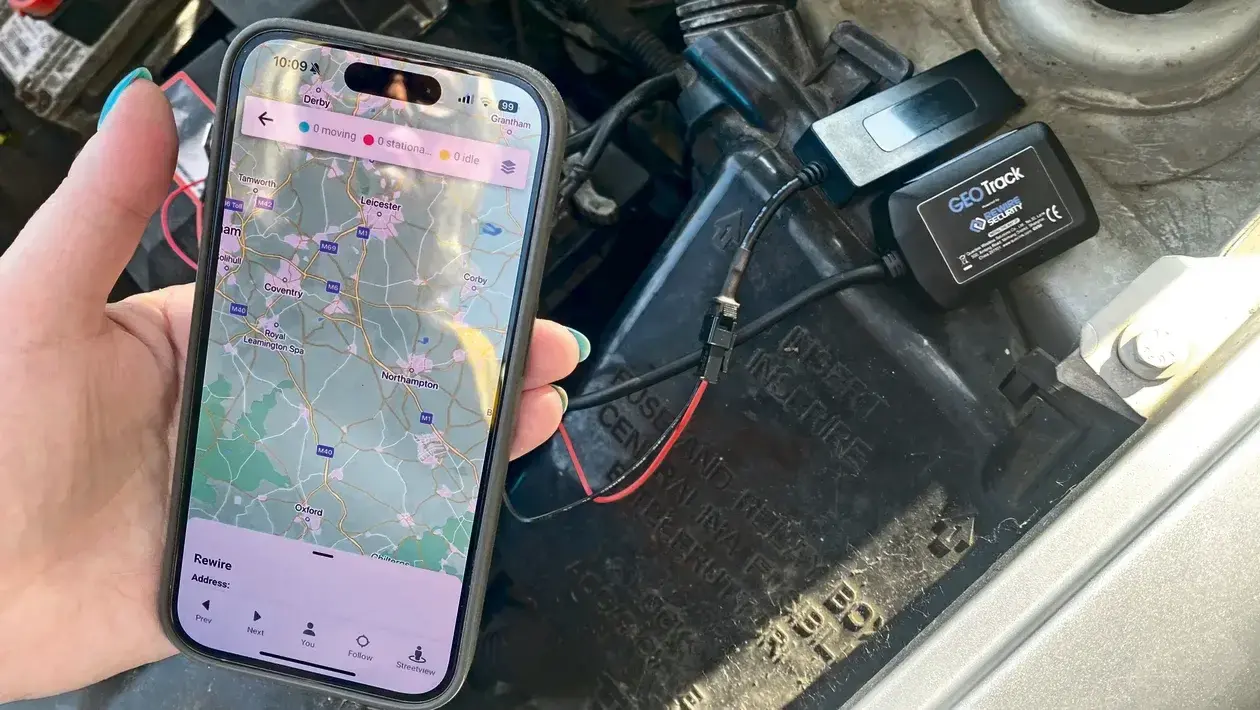
Whether you're trying to keep tabs on your daily driver, monitor a teen's first car, or protect a prized collector vehicle, choosing the right GPS vehicle tracker can feel overwhelming.
I've personally tested every tracker we sell, yes, I install them in my own vehicles, so I know firsthand what works, what’s reliable, and what’s just hype.
In this guide, I’ll walk you through:
- The real benefits of personal-use vehicle GPS tracking
- Key features to look for in a tracker
- The different types of trackers (plug-in, battery-powered, wired)
- My top recommendation for personal vehicle GPS tracking in 2025
- Real-world use cases: From teen driving to car theft recovery
- Frequently asked questions
Why You Might Need a Personal Vehicle GPS Tracker
First, let’s clarify: A vehicle GPS tracker isn’t just for people who worry a lot. It’s a smart tool for security, peace of mind, and even better driving habits. Here’s what I hear from our customers most often:
- Theft protection: Vehicle theft is up in many cities. Real-time tracking lets you recover your car fast, especially if you've invested in modifications and upgrades.
- Teen driver monitoring: Want to make sure your new driver isn’t speeding or going places they shouldn’t? A GPS tracker gives you that visibility, without invading their privacy.
- Elderly family member tracking: GPS can alert you if a loved one gets lost or confused on the road.
- Fleet-lite management: Even if it’s just two or three family cars, GPS trackers help monitor usage and mileage.
- Monitoring stored or seasonal vehicles: Instantly know if your garage-stored car is moved or tampered with—essential for protecting modified rides that may be targets for theft.
What Makes a GPS Vehicle Tracker “The Best”?
With so many GPS trackers flooding the market, from cheap imports to high-end fleet systems, it’s easy to get overwhelmed. Over the last two decades, I’ve tested hundreds of devices personally (yes, in my own cars), and the truth is: “Best” doesn’t always mean “most expensive.”
It means the tracker is reliable, easy to use, and fits your lifestyle. Whether you're monitoring your teenager’s first car, keeping tabs on your daily commuter, or protecting a vintage vehicle from theft, here are the six essential features that make a GPS tracker stand out.
1. Real-Time Tracking
This is the heart of any good GPS tracker. Real-time location updates let you see exactly where your vehicle is, right now.
Look for update frequencies of 5 to 10 seconds. Any slower than that, and you're playing catch-up.
This is especially critical if your vehicle is stolen, you need to give law enforcement accurate, up-to-the-minute data.
Also valuable for parents monitoring new drivers: You’ll know if your teen is where they said they’d be, without constant phone calls.
Think of it like a ride-share app. Would you feel comfortable waiting for your Uber if the location updated every 60 seconds? Same principle applies here.
2. Easy Installation
Not everyone wants to splice wires or drill holes. And you shouldn’t have to.
Here are your three main install options; and how to choose:
- Plug-and-play (OBD-II port): Perfect for everyday drivers. Most cars made after 1996 have this port under the dashboard. Plug in the tracker, and you're done. It powers itself from the car and starts tracking immediately.
- Magnetic Mount (Battery-powered): Great for covert tracking or vehicles where you don’t want a visible device, like a classic car in storage. The powerful magnet lets you stick the device under the chassis or in a hidden compartment.
- Hardwired (Professional or DIY Install): Ideal for long-term protection. Hidden behind the dashboard, it’s invisible to thieves and always powered. Great for high-theft areas or valuable assets.
3. Mobile App Access
It doesn’t matter how powerful the GPS tracker is, if the app is clunky or confusing, it’s not going to help you.
The best trackers come with a user-friendly mobile app (iOS and Android) that lets you:
- See your car’s live location on a map
- View trip history, when it started, where it went, and how long it stayed
- Monitor speed and driving behavior
- Set up and manage custom alerts
You want something that makes sense right away, whether you’re 17 or 70. I’ve always believed that if it takes more than five minutes to figure out, it’s not ready for the road.
4. Custom Alerts
A great GPS tracker doesn't just show you where the car is, it tells you when something unusual happens.
Look for these must-have alerts:
- Speed Alerts – Get notified if the vehicle exceeds a set speed. Essential for teen drivers or monitoring risky driving.
- Geofencing – Draw a virtual fence around home, school, or work. If the car leaves that area, you'll know immediately.
- Tamper/Motion Alerts – Get notified if the tracker is moved or removed, even when the car is off.
- Ignition Alerts – Know when the vehicle is turned on or off—great for valet situations or monitoring unauthorized use.
Real-world scenario: One customer used a geofence around their driveway. When their collector car moved at 3 a.m., they got an alert and called the police. The car was recovered within 30 minutes.
5. Battery Life or Power Source
This is where how you use the tracker really matters. Do you want it always plugged in? Or do you need flexibility?
Here’s how to decide:
Battery-Powered Trackers
- Best for portable, temporary, or covert use.
- Look for 2–3 weeks of battery life on a single charge under normal driving conditions.
- Some models offer power-saving modes when the vehicle is stationary.
OBD-II or Hardwired Trackers
- These pull power from the vehicle, so there’s no battery to charge.
- Great for long-term use, but may draw a small amount of power when the car is off, important to note for seasonal or rarely-used vehicles.
6. Reliability and Support
At the end of the day, all the features in the world don’t matter if the tracker doesn’t work when you need it most.
Here’s what to expect from a truly reliable GPS tracker:
- 4G LTE Cellular Coverage: The best trackers transmit data over a nationwide 4G LTE network, ensuring fast updates and wide coverage across the U.S., Canada, and Mexico.
- Uptime and Accuracy: BrickHouse GPS trackers are tested for 99.9% uptime, with location accuracy within 10–15 feet in most areas.
- Customer Support That Actually Answers: When you’re trying to find your car or manage a tech hiccup, you want to speak to a human. Our U.S.-based support team is trained on every product, and we don’t bury you in hold music.
- Proven Track Record: Our trackers have helped recover thousands of stolen vehicles over the past two decades. From family minivans to Ferraris, this stuff works.
Types of GPS Trackers for Personal Vehicles
| Type |
Best For |
Pros |
Cons |
| OBD-II Trackers |
Everyday vehicles |
Easy install, constant power |
Easy to spot/remove |
| Battery-Powered Trackers |
Covert tracking, trailers, stored cars |
Portable, flexible |
Need to recharge |
| Hardwired Trackers |
Long-term installs, theft recovery |
Hidden, tamper-resistant |
Requires professional install or DIY wiring |
My Top Recommendation for 2025: Spark Nano 7 GPS Tracker
When people ask me which tracker to get for personal use, I always start with the Spark Nano 7 GPS Tracker with Magnetic Case.
Here's Why I Recommend It:
- Real-time tracking with updates as fast as every 10 seconds
- Compact size—about the size of a matchbox
- Portable & flexible—use it in any car, truck, motorcycle, or even backpack
- Excellent battery life—up to 15 days on one charge
- Magnetic case included for under-vehicle mounting
- 4G LTE coverage across North America
- Free mobile app with live map, alerts, and reporting
- Lifetime technical support from our U.S.-based team
Whether you’re securing your own car or helping your teenager build safe driving habits, the Spark Nano gives you the reliability and control you need, without overcomplicating things.
“I put a Spark Nano on my son’s car when he started driving. It gave us both peace of mind and helped him develop safe habits. Now he checks his own driving reports!” — Todd M.
Use Case Examples
- Teen Driver Monitoring: Set speed alerts, geofences around school/home, and get instant updates when the ignition turns on or off.
- Vehicle Theft Recovery: If your car is stolen, real-time GPS can help police recover it quickly, before it’s stripped or shipped out.
- Elderly Driver Safety: Get notified if your loved one veers far from their usual routes or is driving at odd hours.
- Seasonal Vehicle Monitoring: Track if your garage-stored vehicle moves even an inch. Great for motorcycles, boats, RVs, or classic cars.
Final Thoughts: Choosing What’s Right for You
The “best” GPS tracker isn’t always the fanciest. It’s the one that fits your lifestyle and your vehicle. Whether you want set-it-and-forget-it protection or a real-time dashboard for peace of mind, start by asking:
- Do I want easy install or hidden tracking?
- Am I tracking for theft, safety, or both?
- How often do I want to check in?
For most people, the Spark Nano 7 hits that perfect balance of simplicity, power, and portability. I use it myself, and I stand behind it.
FAQ: Personal Vehicle GPS Tracking
Is GPS tracking legal?
Yes. You can legally track any vehicle you own or have permission to track. Just don’t use it to track someone without their consent, especially not romantic partners.
Will a GPS tracker drain my car battery?
Not significantly. OBD and hardwired trackers use very little power, and battery-powered trackers are self-contained.
Does it work without cell signal?
Most GPS trackers use satellites for location and cell networks to report. If you’re in a dead zone, it will store data and upload once back in range.
Can I track from my phone?
Absolutely. BrickHouse GPS trackers come with free iOS and Android apps.
